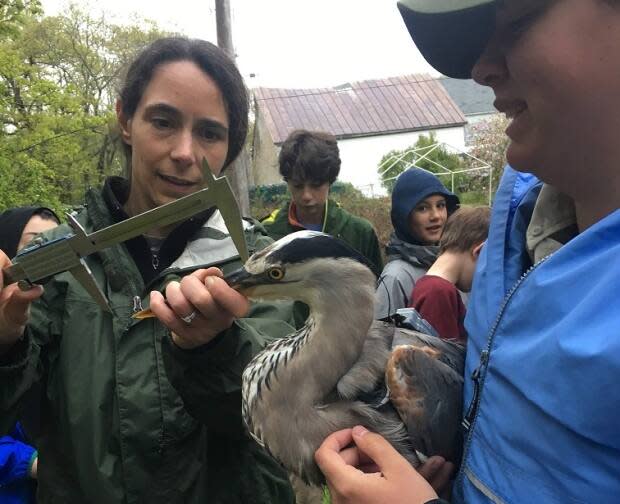Vagabond heron named Harper makes surprise trip from Maine to Bathurst

Harper the heron was caught and tagged in late May by members of the Heron Observation Network in Maine.
Members hoped she was nesting in the Harpswell area, on the southern coast of the state, and would help them with their study into why coastal heron communities are declining in Maine.
But Harper surprised them all by making a beeline north — to Bathurst, N.B.
Danielle D'Auria works with the Maine Department of Inland Fisheries and Wildlife and oversees the Heron Observation Network. She said the network was not expecting Harper to fly off.
"We all were pretty shocked by that at first."
Since Harper's flight north, D'Auria has been in touch with biologists in New Brunswick and Nova Scotia.
In the past two months, Harper has visited four great blue heron colonies in coastal waters in northeastern New Brunswick.
"My theory is that she's prospecting, so kind of looking for a place to nest maybe next year," D'Auria said.
Harper originally hung around Bathurst before visiting communities along the Acadian Peninsula, and for the past two weeks she's been tagged along waterways north of Campbellton.
The trackers used by the Heron Observation Network are solar-powered and attach on the bird's back. They send detailed location information and can last for several years.
Alain Clavette, a biologist in New Brunswick, said herons typically like remote areas on islands or places where there isn't much human activity. And wherever they end up nesting, they need to have good fishing grounds.
Great travellers
Clavette said Harper's journey is pretty typical for a great blue heron.
"They are great travellers, so do they often sort of hang out in one spot and then travel for long periods of time before yet another spot," he said.
They tend to migrate north along the coast of the Atlantic Ocean in the spring and then back south again in the fall.
He believes Harper took a little longer to make it up to New Brunswick because she's either not yet nesting or has grown too old to nest.

D'Auria said it's hard to determine the age of herons after they've reached adulthood. Harper had her adult plumage, which means she was at least two years old.
Clavette suggested Harper was "staging" while she was in Maine, which means she was refuelling on her way to New Brunswick.
"If we go on the highway we will stop … at a place to buy food, to buy gas and we'll stay there for a few minutes," he said. "Well, in the span of a migration of a heron, a bit the same thing," he said.
Hoping for a nesting heron
D'Auria and her crew were initially surprised by Harper's journey because they had thought — and hoped — they'd tagged a nesting heron.
"It was May 29 and in Maine all of our nesting great blue herons typically have either their eggs or have nestlings in their nests at that time of year," she said.
D'Auria was working with a group of students from Harpswell Coastal Academy and they were the ones to give Harper her name. Seeing as they were all invested in the data Harper would give them, they were initially disappointed when she flew away.

But they decided to look on the bright side and adopt a spirit of adventure.
"The excitement of it and the wonder and the fascination of, you know, so what is this bird's story?" she said. "What was she doing in Maine, and where's she gonna go next?"
D'Auria is trying to understand why coastal heron populations have declined. One of the theories is the recovery of the bald eagle population is pushing herons inland. Eagles are natural predators of herons, and their nesting patterns may be disturbing those of the great blue birds.
While Harper won't help with that research, D'Auria is now invested in the heron's future. She said the network will continue to track her story until the GPS tracker gives out.
"We intend to track her for multiple years," she said. "We can only kind of guess and hypothesize what's happening with her … I think over time, you know, things will come to light better."


